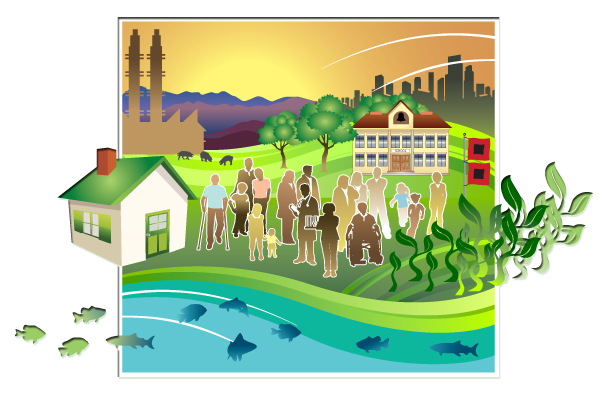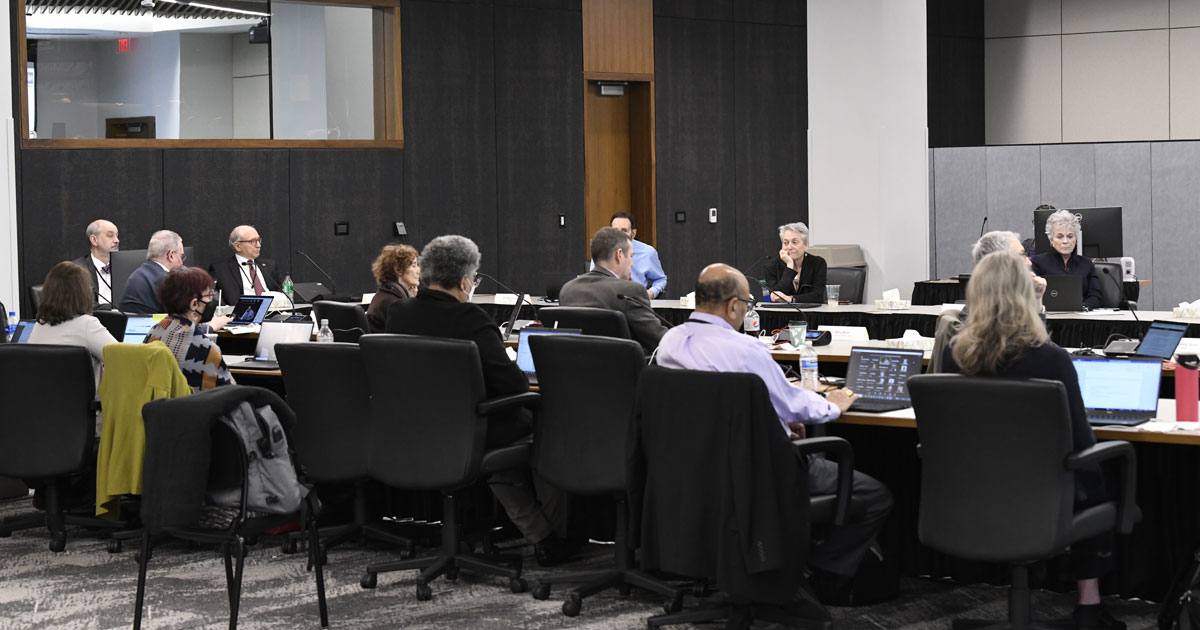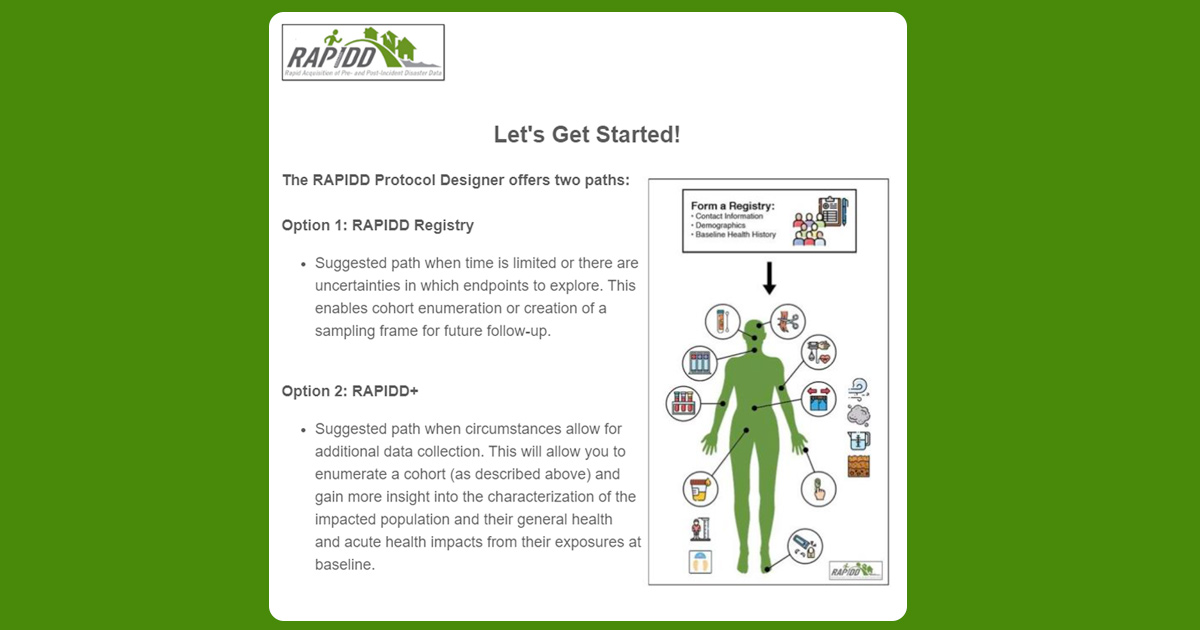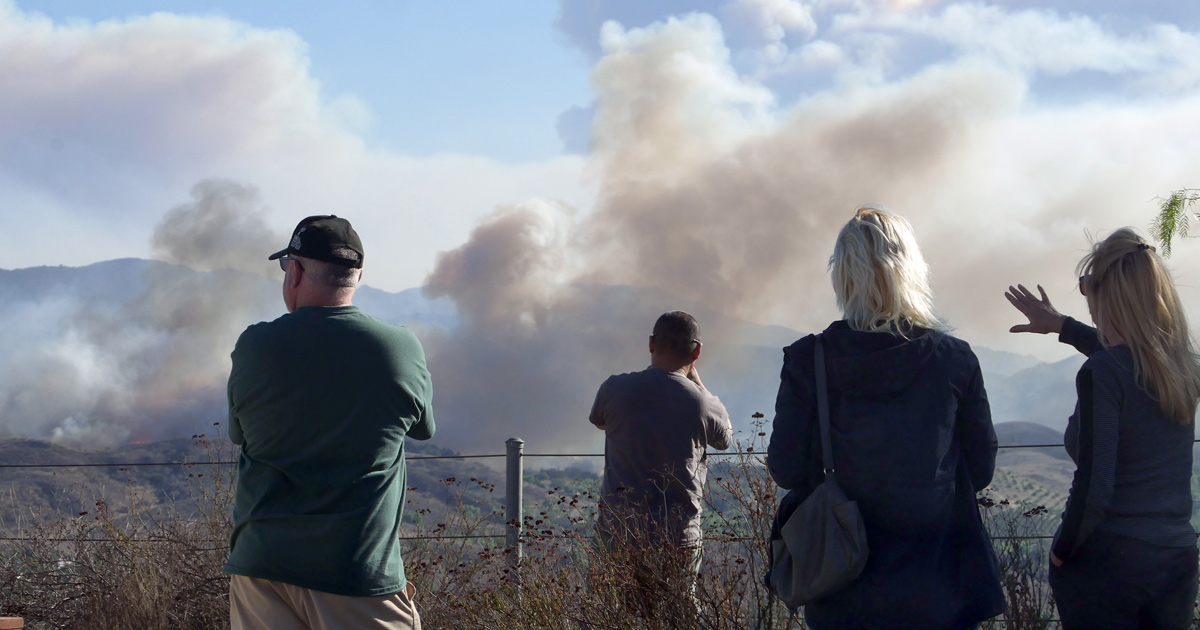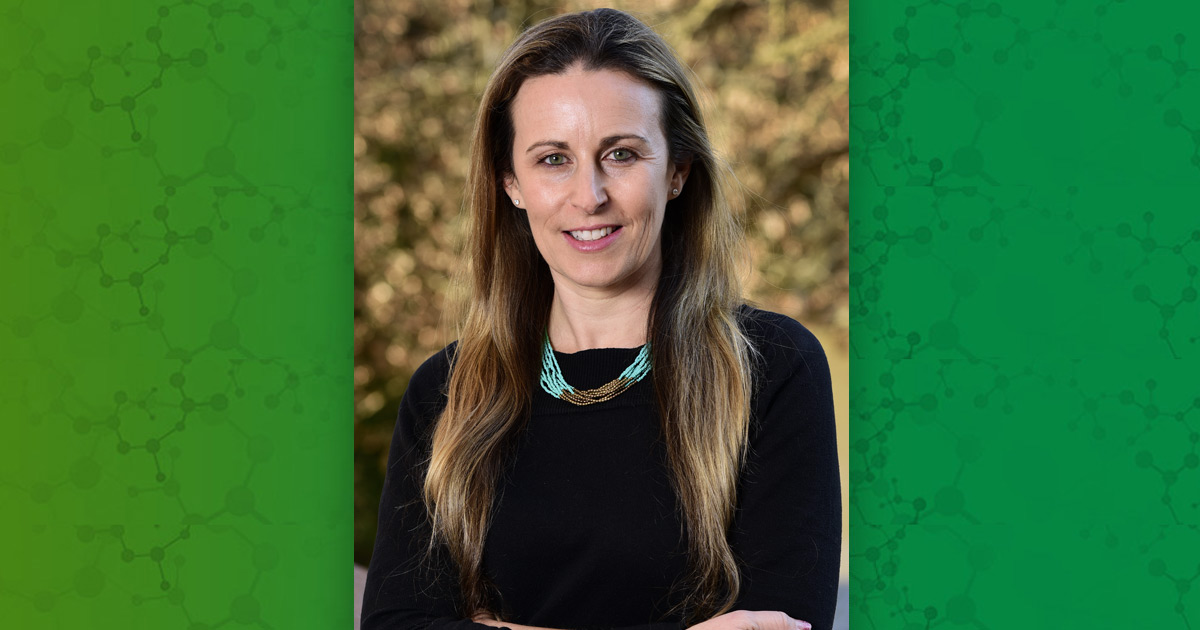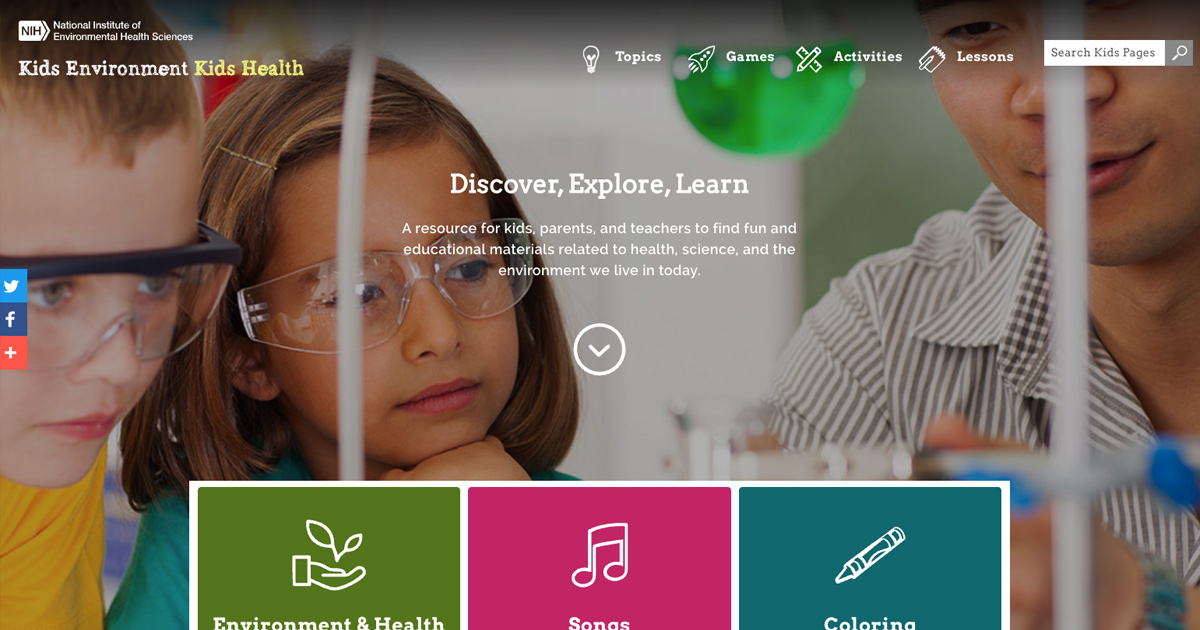Curriculum Promotes Air Quality Research Led by Students
A partnership of high school and university students, community members, and researchers developed an air quality curriculum for student-led research for the Confederated Tribes and Bands of the Yakama Nation, a sovereign nation. Although the curriculum was developed for a rural community, it can be adapted and used in informal learning environments in other communities.
The project was funded by the U.S. Environmental Protection Agency (EPA) and NIEHS. An existing partnership between the University of Washington (UW) and Heritage University (HU), a Hispanic- and Native American-Serving Non-Tribal Institution, facilitated the collaboration. UW and HU university partners worked with White Swan High School (WSHS) students in the Yakima Valley region of Washington state. A September 2022 paper describes the curriculum and partnership.
“Many of the students we have worked with over the years have expressed concern with the prevalence of respiratory illnesses in our communities,” stated Jessica Black, Ph.D., director of the HU Center for Indigenous Health, Culture, and Environment. “Students were excited to work with UW scientists who could help them understand the link between air quality and health while conducting mentored scientific research projects.”
An Air Quality Research Curriculum Tailored to High School Students
The curriculum consists of education in environmental health and air quality, student-initiated research projects using low-cost air sensors, and research communication. The program has four objectives:
- Develop student data analysis skills.
- Enable students to design air quality research projects.
- Encourage community engagement on air quality topics.
- Support student communication of scientific results.
HU undergraduate student-mentors delivered the curriculum to the high school students in a once-weekly after-school program over the course of an academic year, covering information on air quality and related environmental health topics through slides. The student-mentors also used hands-on activities, such as a light-scattering demonstration to reinforce key concepts such as how the air sensors operate.
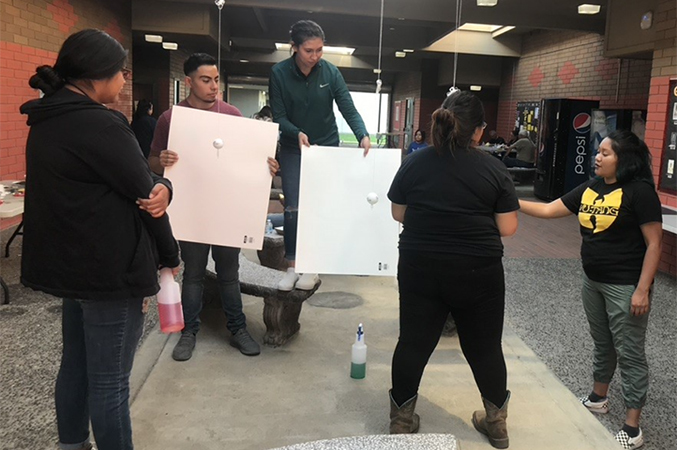
WSHS students and HU undergraduate student-mentors setting up for a light-scattering demonstration that reinforces how the air sensors work. (Photo courtesy of Jessica Black)
“It was important to us to continuously improve the curriculum in response to high school and undergraduate student feedback,” reflected Orly Stampfer, M.P.H., a doctoral student in Environmental and Occupational Health at UW and a lead researcher of this work. “It was a great opportunity to work with the student-mentors to tailor the curriculum. We developed the light-scattering activity in direct response to students expressing interest in learning more about how the low-cost air sensors work.”
Through the curriculum, high school students learned how to use air sensors and interpret the data. Students developed research ideas and presented them to the HU mentors, who, in turn, shared the students’ project ideas with UW researchers. Researcher feedback helped students finalize their research plans.
After refining their research plans, the students installed air monitors with support from their HU mentors. The students and their mentors regularly collected data from the monitors and analyzed the data to answer the research questions for their projects.
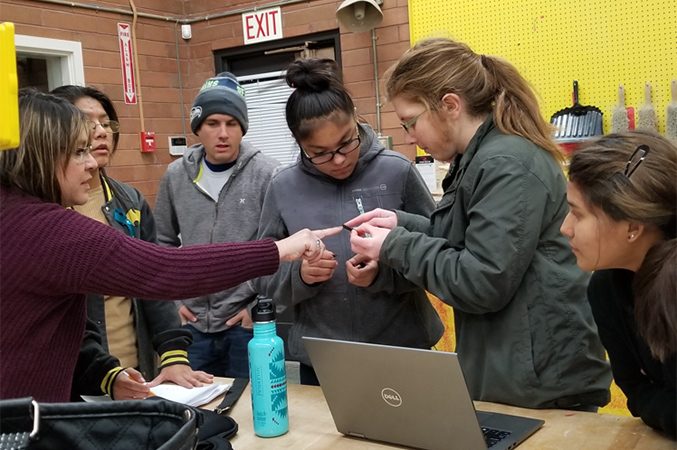
HU mentors showing WSHS students how to download data from the air monitors. (Photo courtesy of Aiyana Holt-Zack, an HU undergraduate student-mentor involved in the project)
“Once the students understood the importance of what they were learning in the program, it made their projects feel more personal and helped answer questions they had regarding air quality,” stated Omar Torres, previously a lead HU mentor. “This was reflected in the students' projects, which were all centered around locations within their own communities.”
High school students learned about presentation methods during visits to HU. With input from the mentors and UW researchers, students prepared and presented posters at a community science fair. Additionally, students had the opportunity to present at a national science fair in Washington, D.C.
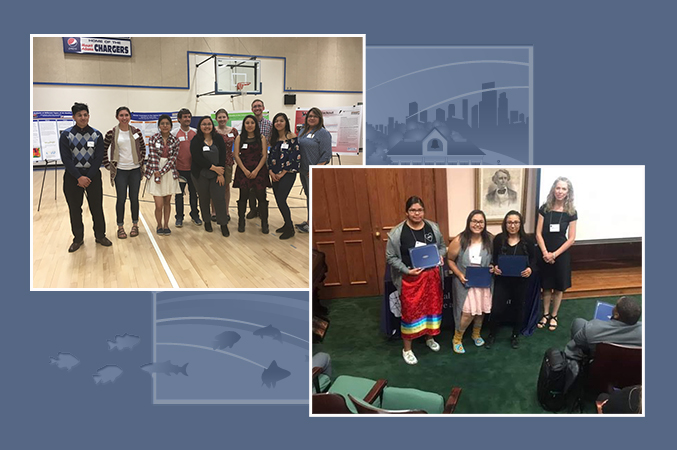
(Left) Students and mentors with their posters at the community science fair in 2018 (Photo courtesy of Maria Tchong-French, Research Industrial Hygienist at UW); and (right) WSHS students presenting their work at the 2019 EnvironMentors conference in Washington, D.C. (Photo courtesy of Omar Torres)
“One of the most powerful parts of this program was the intergenerational mentoring that occurred between the UW and HU scientists, the HU undergraduate mentors, and the WSHS students. Each group felt they were making a significant contribution to the well-being of our community and giving back by helping the next generation succeed,” stated Black. “The community science fair was empowering for our student participants. Community members were able to let the students know how important they felt their scientific research was.”
Partnerships Support Development of Curriculum
The success of this curriculum development project can be attributed to a 10-year partnership between HU and WSHS, which has been sustained in part by the HU chapter of EnvironMentors, a program that promotes mentorship in environmental education. UW and HU had also already fostered a relationship through El Proyecto Bienestar, a partnership with a history of multiple NIEHS-funded community health projects. When UW researchers asked HU faculty to collaborate on an EPA grant opportunity to use air sensors in a community-engaged project, HU faculty quickly recommended building off their successful partnership with WSHS.
In addition to Black, Stampfer, and Torres, the project team included HU undergraduate student mentors and UW faculty members Elena Austin, Edmund Seto, and Catherine Karr. In addition to the project team, the curriculum development was also supported by a Project Advisory Committee, which included representatives from the WSHS school district, the Yakama Nation Environmental Management Program, Indian Health Service, a tribal health nonprofit, and El Proyecto Bienestar.
Future Directions of the Program
The HU EnvironMentors program continues to use the curriculum to promote student-led research. The curriculum has been modified in response to HU and student feedback. For example, the team reduced the number of slides in the presentations and increased time spent on hands-on activities. In addition, they are providing students with more instruction on data collection and analysis. The success of this curriculum project helped HU receive a new EPA grant to conduct a tribal air sensor loan program through the EnvironMentors program.
Stampfer continues to lead air quality projects, and has received an NIEHS-funded fellowship award to conduct research on wildfire smoke preparedness in schools. Stampfer’s work emphasizes community engagement, building from valuable experience fostering research partnerships during the curriculum development project.
Personal Exposure Monitoring Promotes Behavior Change that Limits Environmental Exposures
A team of NIEHS-funded researchers found that personal air pollution exposure monitoring can help people change their perceptions and behaviors related to air pollution. The team was interested in studying how a person’s exposure varies with daily activity. The prior lack of such data made it difficult for people to reduce their exposures.
During the study, participants carried a portable monitor and kept a diary of their travel and activities for three days. They also completed a pre- and post-session survey about their air pollution-related behaviors, and some participants were interviewed. When the researchers analyzed individual exposure profiles, they found that most participants were exposed to more particulate matter indoors, especially when cooking. The researchers also found that after the intervention, as compared to before it, participants reported more concern about the health effects of air quality. Participants also reported taking more action to decrease exposure, such as choosing cleaner travel modes and taking protective measures when their exposure levels were expected to be high.
Toolkit for Frontline Community Clinics, and Administrators on Heat, Wildfires, and Hurricanes
A new climate resilience toolkit for frontline health clinics was launched in December 2022. Harvard T.H. Chan School of Public Health’s Center for Climate, Health, and the Global Environment developed the toolkit in collaboration with Americares. The toolkit is organized into three sections: heat, wildfires, and hurricanes and flooding. Within each section, information is available for providers, patients, and administrators. For example, the heat-related patient information includes tip sheets on conditions such as mental health disorders, diabetes, and asthma, while the information for administrators covers topics such as facility preparedness, communication templates, and long-term climate resilience. Provider information includes guidance on how to set up a heat action plan with patients and how to care for patients with conditions that may be worsened by extreme heat. The toolkit was informed by the results from a nationwide survey and focus groups held in pilot clinics throughout the U.S. that experienced recurring emergencies due to climate change. The toolkit will be adapted for use in additional clinics across the U.S. and in low- and middle-income countries.
Evidence-Based Resources Help Organizations Achieve Healthy People 2030 Objectives
Healthy People 2030, a federal initiative, sets public health priorities aimed at improving health and well-being. Healthy People 2030, the fifth iteration of the program, provides Evidence-Based Resources that were vetted by national subject matter experts. These resources can help communities, public health professionals, health care providers, and organizations achieve the objectives set by Healthy People 2030. The Evidence-Based Resources related to environmental health include interventions to reduce ambient particulate matter air pollution and recommended care for children based on blood lead levels. One specific example describes how a public health professional could start a tobacco cessation program. The examples describe the steps to begin a program, starting with identifying the need, finding resources to support an effort’s goals, engaging with community partners, and finally conducting program implementation and evaluation. The resources are organized by health condition; health behaviors, such as emergency preparedness; populations; settings and systems, such as environmental health; or social determinants of health, such as community context or built environment. Learn more about using Evidence-Based Resources in your work.
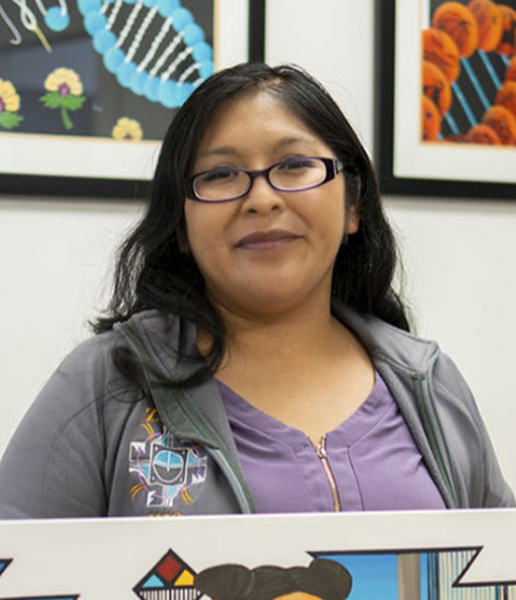
PEPH Grantee Highlight
Mallery Quetawki
Mallery Quetawki is the artist-in-residence at the University of New Mexico College of Pharmacy’s Community Environmental Health Program, where she blends science and art to improve environmental health literacy among New Mexico’s Indigenous communities. She works with the College of Pharmacy’s Center for Native American Environmental Health Equity Research, the School of Medicine, and the NIEHS-funded Metals Exposure and Toxicity Assessment on Tribal Lands in the Southwest Superfund Research Program Center.
Funding Opportunities
PHS 2022-2 Omnibus Solicitation of the NIH, CDC, and FDA for Small Business Innovation Research Grant Applications (Parent SBIR [R43/R44] Clinical Trial Not Allowed)
Enables U.S. owned-and-operated small businesses to conduct research and development that has a strong potential for commercialization. This award and the associated PHS 2022-2 Omnibus Solicitation of the NIH and CDC for Small Business Innovation Research Grant Applications (Parent SBIR [R43/R44] Clinical Trial Required) provide funds for small businesses to stimulate technological innovation in the private sector and strengthen the role of small business in meeting federal research and development needs. The related Small Business Technology Transfer announcements [PHS 2022-2 Omnibus Solicitation of the NIH for Small Business Technology Transfer Grant Applications (Parent STTR [R41/R42] Clinical Trial Not Allowed) and PHS 2022-2 Omnibus Solicitation of the NIH for Small Business Technology Transfer Grant Applications (Parent STTR [R41/R42] Clinical Trial Required)] aim to foster technology transfer through cooperative research and development between small businesses and research institutions.
Deadlines: January 5, 2023; April 5, 2023
Environmental Protection Agency (EPA) Environmental Justice Collaborative Problem-Solving Program (EJCPS) Cooperative Agreements
EPA’s EJCPS Cooperative Agreement Program provides financial assistance to eligible organizations working on or planning to work on projects to address local environmental and/or public health issues in their communities. The program assists recipients in building collaborative partnerships with other stakeholders (e.g., local businesses and industry, local government, medical service providers, academia, etc.) to develop solutions that will significantly address environmental and/or public health issues at the local level. Special consideration will be given to the following focus areas:
Deadline: April 10, 2023
Environmental Protection Agency (EPA) Environmental Justice Government-to-Government Program (EJG2G)
The EJG2G Program works to support and/or create model state activities that lead to measurable environmental or public health results in communities disproportionately burdened by environmental harms and risks. These models should leverage or utilize existing resources or assets of state agencies to develop key tools and processes that integrate environmental justice considerations into state governments and government programs. Special consideration will be given to the following focus areas:
Deadline: April 10, 2023
Environmental Health Sciences Core Centers (EHSCC) (P30 Clinical Trial Optional)
Invites grant applications for Environmental Health Sciences Core Centers (EHS CC). As intellectual hubs for environmental health science research, the EHS CC is expected to be the thought leaders for the field and advance the goals of the NIEHS Strategic Plan. The Core Centers provide critical research infrastructure, shared facilities, services and/or resources, to groups of investigators conducting environmental health sciences research. The structure of the Center should facilitate multi-directional interaction with communities and EHS CC members through the required Community Engagement Core (CEC). In addition, EHS Cores are expected to attract established and promising investigators into environmental health research and provide opportunities for career enhancement. Finally, this FOA requires a Plan for Enhancing Diverse Perspectives as part of the application. NIEHS will hold an informational webinar/Q&A session Friday January 20, 2023, from 1:00 – 3:00 p.m. EDT. Registration is available.
Deadline: April 19, 2023
Exploratory Grants for Climate Change and Health Research Center Development (P20 Clinical Trial Optional)
Supports the development of an innovative research environment to foster and sustain a transdisciplinary program of fundamental and applied research to explore the complex impacts of climate change on health and to develop action-oriented strategies that protect health and build resiliency at the individual, community, national and global levels. A major goal for this program is to build research teams as well as collaborations with communities and other key partners. The program seeks innovative research and pilot/feasibility projects that utilize transdisciplinary approaches to address questions relevant to climate change impacts on health. Applications for these Climate Change and Health Research Development Centers should propose planning and development activities in preparation to build institutional research capacity for future proposals addressing climate and health. NIH held an informational webinar/Q&A session March 24, from 1:00pm-3:00pm EDT. The slides and a Frequently Asked Questions document will be available following the session. Please feel free to reach out to the NIEHS Scientific/Research Point of Contact, Abee Boyles, if you are unable to attend the session or have additional questions.
Deadlines: May 1, 2023; November 7, 2023
Notice of Special Interest (NOSI): Climate Change and Health Administrative Supplements
As part of the NIH-wide Climate Change and Health Initiative, these supplements will enrich and expand the research community in climate change and health to include new researchers from multiple disciplines, both in the U.S. and in low- and middle-income countries globally. The supplements will support research that creates new knowledge to reduce or mitigate health threats attributable to climate change across the lifespan and build health resilience or develop adaptation mechanisms for individuals, communities, and nations around the world, especially among those at increased risk from, or disproportionately affected by, the impacts of climate change.
Deadline: May 8, 2023
Ruth L. Kirschstein National Research Service Award (NRSA) Institutional Research Training Grant (Parent T32)
Supports development of and/or enhances research training opportunities for individuals interested in careers in biomedical, behavioral or social sciences, clinical research, health services research, or in any other research discipline related to the NIH mission. The NIH Ruth L. Kirschstein National Research Service Award (NRSA) program helps ensure a diverse pool of highly trained scientists is available in appropriate scientific disciplines to address the nation's biomedical, behavioral, and clinical research needs. To accomplish this goal, NRSA training programs are designed to train individuals to conduct research and to prepare for research careers. More information about NRSA programs may be found at the Ruth L. Kirschstein National Research Service Award (NRSA) website.
Deadlines: May 25, 2023; September 25, 2023
Ruth L. Kirschstein National Research Service Award (NRSA) Short-Term Institutional Research Training Grant (Parent T35)
Provides short-term support for a period of at least 8, but no more than 12, weeks in a grant year for full-time training experiences under the supervision of experienced researchers. Supports training opportunities for predoctoral students interested in careers in biomedical, behavioral, or clinical research. This program is also intended to encourage training of graduate students in the physical or quantitative sciences to pursue research careers by short-term exposure to, and involvement in, the health-related sciences. The training should be of sufficient depth to enable the trainees, upon completion of the program, to have a thorough exposure to the principles underlying the conduct of biomedical research.
Deadline: May 25, 2023
Time-Sensitive Research Opportunities in Environmental Health Sciences (R21 Clinical Trial Not Allowed)
Supports research in environmental health science in which an event has or will imminently occur that provides a limited window of opportunity to collect samples and data to support the assessment of exposures and human health impact. The goal of the program is to characterize initial exposures, collect human biological samples, or collect human health and exposure data in order to provide critical information to understand exposure-health outcome relationships, with the goal of providing data that will facilitate timely action to protect public health. The program also supports the use of innovative techniques (hazard identification, sensing and mitigation technologies) that are uniquely valuable for deployment at a time of disaster to inform our understanding of the human health impacts of the disaster.
Deadlines: April 3, 2023; June 1, 2023
Notice of Intent to Publish a Funding Opportunity Announcement for Reporting Back Environmental Health and Non-Genomic Research Results
NIEHS, in partnership with the NIH Office of Science Policy (OSP) and the All of Us Research Program, intends to publish a FOA for applications that identify, develop, and test strategies for reporting back environmental health and non-genomic research results to study participants and/or key partners. Applications will be sought that advance the field of reporting back of research results (RBRR) for environmental health and non-genomic research results to help establish best practices/guidelines through research and evaluation; improve understanding of perceived risks and benefits, challenges, and obstacles to inform the practice of RBRR; and better understand how RBRR can help improve health equity and reduce health disparities. Potential applicants are highly encouraged to contact Liam O'Fallon at NIEHS. The estimated date of publication of this FOA is April 3, 2023.
Deadline: June 5, 2023
Research to Action: Assessing and Addressing Community Exposures to Environmental Contaminants (R01 Clinical Trial Optional)
Encourages multidisciplinary projects to investigate the potential health risks of environmental exposures of concern to a community and to implement an environmental public health action plan based on research findings. Projects supported under this program are expected to employ community-engaged research methods to not only conduct research but also to seamlessly translate research findings into public health action. Check out the Research to Action Currently Funded Grantees webpage for a sense of the types of projects supported through this FOA.
Deadline: January 21, 2020
SBIR E-Learning for HAZMAT and Emergency Response (R43/R44 Clinical Trial Not Allowed)
Encourages Small Business Innovation Research (SBIR) grant applications from small business concerns that propose to further the development of Advanced Technology Training (ATT) products for the health and safety training of hazardous materials (HAZMAT) workers; waste treatment personnel; skilled support personnel associated with an emergency/disaster; emergency responders in biosafety response, infectious disease training and cleanup; emergency responders in disasters and resiliency training; and for ATT tools to assist in responding to environmental disasters. The major objective of the NIEHS Worker Training Program (WTP) is to prevent work related harm by assisting in the training of workers in how best to protect themselves and their communities from exposure to hazardous materials. NIEHS encourages applicants to review the SBIR E-Learning for HAZMAT Program, to pursue partnerships and collaboration with awardees of the WTP program, and to design new technology-enhanced training methods or e-Learning products that can enhance the existing NIEHS supported curricula and training programs while adhering to the Minimum Health and Safety Training Criteria: Guidance for Hazardous Waste Operations and Emergency Response (HAZWOPER) and HAZWOPER-Supporting Training.
Deadline: July 30, 2021
Letter of Intent: June 30, 2021
Addressing the Impact of Structural Racism and Discrimination on Minority Health and Health Disparities (R01 - Clinical Trial Optional)
Supports intervention research to address the impact of structural racism and discrimination on minority health and health disparities. Research projects must address structural racism and discrimination in one or more NIH-designated populations with health disparities in the U.S. and should address documented disparities in health outcomes. Applications are also expected to provide a conceptual model identifying hypothesized pathways between the structural racism and discrimination and health outcomes. NIEHS is interested in applications that are within scope of its 2018-2023 Strategic Plan, meet the criteria established in this FOA, and focus on intervention research that mitigates or prevents the impacts of environmental exposures on communities due to structural racism and discrimination. Applicants are strongly encouraged to utilize community-engaged research approaches that ensure equity, such as including community partners as part of the research team and having letters of support from community partners. Applications that demonstrate collaborative (i.e., community-academic partnerships) intervention approaches to address the negative health effects of structural racism and discrimination across multiple populations with environmental health disparities will be prioritized.
Deadlines: March 24, 2023; October 10, 2023




